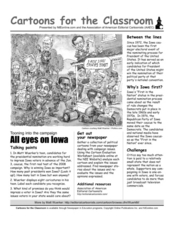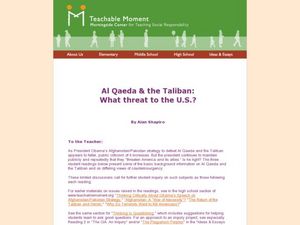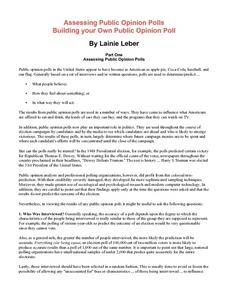Curated OER
Cartoons for the Classroom: Celebrating the 19th Amendment
Eighty-eight years after women earned the right to vote, a women ran for president. Young analysts consider the role women play in politics, how they are portrayed, the standards they are held to, and if they are still treated unfairly...
Curated OER
Lesson 12- Quincy Jones:What Makes an American Master?
Young scholars study the life of Quincy Jones and research black music for selected decades of the 20th Century. They discuss the qualities that help one create and sustain a successful career. They design a timeline of what their future...
Curated OER
Franklin D. Roosevelt
In this presidential history worksheet, students respond to 9 essay and short answer questions about the presidency of Franklin D. Roosevelt.
Curated OER
What Made George Washington a Great Leader?
Students examine the leadership attributes of George Washington. In this George Washington lesson, students listen to their instructor present a lecture regarding the leadership of first president. Students respond to discussion...
Curated OER
Our Unfinished Work
Students investigate the racism elements after the election of President Barack Obama. In this racism lesson, students read a recent article about 'post-racial' society. Students compile a list of achieving a post-racial society and...
Curated OER
Cartoons for the Classroom: All Eyes on the Iowa Caucus
Explore the primary elections through political cartoons. Three talking points guide deeper thinking as pupils analyze a cartoon, which depicts the 2008 campaigning in Iowa. Analysts identify caricatures, research why winning Iowa is...
Curated OER
The Alien and Sedition Acts: Defining American Freedom
Eleventh graders explore the purpose of the Alien and Sedition Acts. In this US History lesson, 11th graders analyze primary source documents. Students write an essay using writing prompts.
Curated OER
The Alien and Sedition Acts: Defining American Freedom
Students analyze the Alien and Sedition Acts. In this Bill of Rights lesson, students listen to their instructor present a lecture regarding the details of the Alien Act and the Sedition Acts. Students examine Supreme Court cases...
Curated OER
Hemispheric Harmony
Young scholars express their opinion on issues related to Central America. After reading an article, they discuss the relations between the Presidents of Mexico and the United States. Using the internet, they research a part of the...
Curated OER
Keeping It Quiet
Students consider ways in which countries use censorship to control information. They examine China's recent abridgement of a politician's speech and consider China's recent history with other nations to better explain why censorship is...
Curated OER
Defense Mechanisms
Students examine the Cold War roots of the recent debate over the construction of United States and Russian missile defense shields. They begin by reading and discussing the article, Putin Says Russia Would Counter U.S. Shield.
Curated OER
The Buckshot Stops Here
Students study the incident between Vice President Dick Cheney and his friend while hunting. They brainstorm and research different scandals throughout History and complete a homework assignment.
Curated OER
Cartoons for the Classroom: Donkeys, Elephants, and Elections
In this current events worksheet, students analyze political cartoons about the 2006 American mid-term elections. Students then respond to 3 short answer questions.
Anti-Defamation League
The Gender Wage Gap
"Equal pay for equal work!" may sound logical but it is not the reality. High schoolers begin a study of the gender wage gap with an activity that asks them to position themselves along a line that indicates whether they strongly agree...
Curated OER
Using Current Events to Understand Elections
Eleventh graders explore the the major phases of the electoral process for president. For this US Government lesson, 11th graders compare and contrast the delegate system of nomination and the electoral college.
Curated OER
Barbara Jordan
Young scholars examine the contributions made to our country by Barbara Jordan. They read and discuss the books "The Sneetches" and "Building a Bridge," write journal entries, participate in a discrimination simulation, create a class...
Curated OER
Moonwalking to Mars?
Students examine a quote from George W. Bush's recent speech on space exploration. They evaluate one writer's stance on Bush's space exploration goals by reading and discussing "Plea to Policy Makers: Let's Take Another Giant Step." In...
Curated OER
A Date Which Will Live In Infamy
Learners use President Franklin D. Roosevelt's radio address following the attack on Pearl Harbor as a primary source to explain American reaction following the attacks. They explain how different Americans reacted to FDR's call for war.
Curated OER
Stand and Deliver
Young scholars take a closer look at the presidential election of 2004. In this American politics instructional activity, students visit selected websites to learn about the 2004 campaign and active citizenship. Young scholars then...
Curated OER
The Nonlegislative Powers
Eleventh graders examine the powers of Congress. In this American Government lesson, 11th graders read about Congress. Students complete a worksheet on their findings.
Curated OER
U.S. Expansion and the Age of Empire
In this American foreign policy worksheet, students respond to 20 essay questions about expansionism in the country during the 20th century.
Curated OER
Al Qaeda & the Taliban: What threat to the U.S.?
Students examine the War on Terror. In this national security lesson, students read articles about the War on Terror and President Obama's foreign policy. Students respond to discussion questions and debate the presence of U.S. troops...
Curated OER
The Battle of Honey Springs: The Civil War Comes to the Indian Territory (68)
Learn how the Civil War created fierce conflicts among American Indian nations who had been moved across the Mississippi River.
Curated OER
Assessing Public Opinion Polls
High schoolers are introduced to the purpose of public opinion polls. Using recent polls, they determine the demographics of who was interviewed and when and where the interview was conducted. In groups, they develop their own public...

























